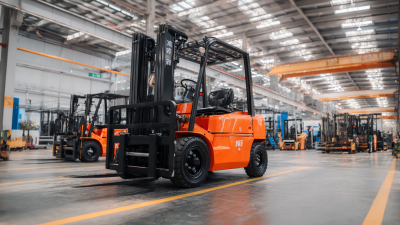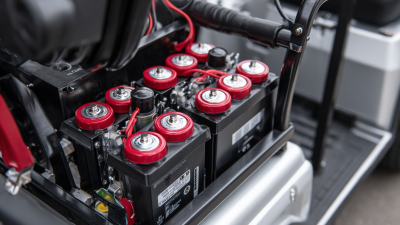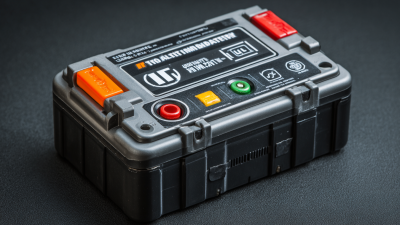Factory Tour
Exploring Innovative Alternatives for 80v Forklift Battery Solutions
As industries strive for greater efficiency and sustainability, the focus on innovative solutions in the realm of material handling equipment, particularly in the context of "80v Forklift Battery" options, has never been more critical. Traditional lead-acid batteries are increasingly being challenged by cutting-edge technologies that promise enhanced performance, longevity, and reduced environmental impact.

This blog will delve into various groundbreaking alternatives being explored for 80v Forklift Battery applications, including lithium-ion, nickel-cadmium, and advanced lead-acid options. By examining these innovative battery solutions, we aim to highlight their respective advantages, challenges, and potential to transform the forklift industry, making it more adaptable to the evolving demands of modern warehouses and distribution centers.
Join us as we uncover the future of powering forklifts and enhancing operational efficiency through these promising alternatives.
Innovative Battery Technologies: Disrupting the 80v Forklift Market
As the forklift industry embraces the shift toward electric solutions, innovative battery technologies are emerging as game-changers in the 80v forklift market. According to a recent report by Research and Markets, the global electric forklift market is projected to grow at a CAGR of 5.7% from 2021 to 2026, driven by advancements in battery technology. Lithium-ion batteries have risen as a preferred choice due to their lighter weight, longer lifespan, and faster charging capabilities compared to traditional lead-acid batteries. This transition not only enhances productivity by reducing downtime but also significantly lowers overall operational costs.
Moreover, technology like solid-state batteries and fast-charging systems is being explored to further disrupt the conventional forklift battery landscape. Solid-state batteries, in particular, promise increased energy density and safety, boasting a potential lifespan three times that of conventional lithium-ion cells.
Market analysts anticipate that by 2025, solid-state technology could account for 20% of the forklift battery market as manufacturers seek more sustainable and efficient solutions to meet growing demands. These innovations not only aim to improve operational efficiencies but also contribute to reduced carbon footprints, aligning with global sustainability goals.
Comparative Analysis of Lithium-ion vs Lead-acid Forklift Batteries
When it comes to modern forklift operation, choosing the right battery type is crucial for maximizing efficiency and productivity. Lithium-ion batteries have emerged as a strong alternative to the traditional lead-acid batteries, offering several significant advantages. For one, lithium-ion batteries are known for their high energy density, which translates to longer run times and less frequent recharging. This can dramatically reduce downtime and increase the overall operational capacity of the forklifts, making them ideal for intensive use in warehouses and manufacturing environments.
Moreover, lithium-ion batteries require less maintenance compared to lead-acid options. They do not need regular watering and have a longer lifespan, often outlasting lead-acid batteries by two to three times. This longevity not only minimizes downtime for maintenance but also leads to lower costs over time, making them a more economical choice in the long run. However, the initial investment for lithium-ion batteries can be higher, which is a critical consideration for many businesses when evaluating battery solutions for their forklift fleets. Understanding these differences in performance and maintenance needs is essential for making an informed decision that aligns with operational goals.

Emerging Trends in Energy Storage Solutions for Industrial Application
The industrial landscape is increasingly influenced by emerging trends in energy storage solutions, particularly as businesses look for innovative alternatives to traditional power sources. As industries adopt forklift technologies that require efficient 80v battery systems, the focus on advanced energy storage technologies is paramount. With the surge in clean energy investments, we are witnessing substantial advancements in energy systems that promise to enhance the operational efficiency of industrial applications.
Recent developments highlight the critical role of artificial intelligence in accelerating energy transitions, improving deployment strategies for renewable resources, and optimizing energy management. Innovations in energy storage, such as electrochemical systems and smart grid integration, offer the potential to overcome challenges previously faced in sustainable energy adoption. As we look toward 2025, these trends indicate a significant shift toward more resilient, efficient, and cleaner energy solutions that will not only enhance productivity in industrial settings but also pave the way for a more sustainable future.
Exploring Innovative Alternatives for 80v Forklift Battery Solutions - Emerging Trends in Energy Storage Solutions for Industrial Application
| Battery Type | Energy Density (Wh/kg) | Lifecycle (Charge/Discharge Cycles) | Charge Time (hours) | Temperature Range (°C) | Weight (kg) |
|---|---|---|---|---|---|
| Lithium-ion | 150 | 2000 | 2 | -20 to 60 | 300 |
| Lead-acid | 30 | 500 | 8 | 0 to 40 | 450 |
| Nickel-Metal Hydride | 70 | 1000 | 4 | -20 to 50 | 400 |
| Solid-state | 250 | 3000 | 1 | -40 to 60 | 250 |
| Flow Battery | 40 | 10000 | 24 | 0 to 50 | 500 |
Case Studies: Successful Implementations of 80v Battery Alternatives
In recent years, the adoption of innovative alternatives to traditional 80v forklift battery solutions has gained traction in various industries. Case studies illustrate the successful implementation of these alternatives, highlighting enhanced operational efficiency and reduced costs. For instance, a leading logistics firm reported a 25% increase in operational uptime after transitioning to lithium-ion battery systems. According to a report from the Forklift Battery Manufacturing Association, the lithium-ion market is expected to grow by 30% annually, signifying a clear shift in industry preferences towards advanced battery technologies.
Another notable case involves a manufacturing plant that replaced its conventional lead-acid batteries with a specialized nickel-metal hydride (NiMH) solution. This transition not only cut down charging times significantly—reducing them from 8 hours to just 1.5 hours—but also improved energy density. Research by the National Renewable Energy Laboratory indicates that such alternatives can lead to a 20% reduction in overall energy consumption in material handling applications. This momentum showcases that innovative battery solutions not only fulfill the performance metrics critical in high-demand environments but also align with sustainability goals by reducing carbon footprints significantly.

Future Outlook: What’s Next for Forklift Battery Development?
The future of forklift battery development is poised for significant transformation, driven by advancements in technology and a growing demand for more efficient industrial solutions. According to a report by Freedonia Group, the global market for electric forklift batteries is projected to reach $22 billion by 2027, underscoring the momentum towards electric-powered logistics. Within this evolution, the focus is shifting towards 80V battery solutions, which promise enhanced performance and longer operational lifetimes compared to traditional power sources.
As materials science progresses, innovations such as lithium-ion and solid-state batteries are becoming key contenders in the forklift sector. Research conducted by the International Energy Agency indicates that lithium-ion technology could reduce battery replacement frequency by as much as 30%, minimizing downtime and lowering long-term costs for manufacturers. Furthermore, there is a marked trend towards recyclability and sustainability, with an increasing number of companies exploring eco-friendly alternatives that align with global carbon reduction goals. This convergence of efficiency and sustainability is likely to redefine the electric forklift landscape in the coming years, making it critical for businesses to stay ahead of these developments.
Related Posts
-

7 Best Features of 80v Forklift Battery That Will Maximize Your Warehouse Efficiency
-

Precision Engineering in China Elevates the Best 48v 300ah Forklift Battery for Global Service
-

Essential Forklift Battery Maintenance Checklist for Optimal Performance
-

7 Essential Forklift Battery Tips Every Global Buyer Should Know
-

Unleashing Performance: Best Practices for 48V Golf Cart Battery Pack Optimization
-

Ultimate Guide to Choosing the Best Automobile Start Lithium Battery for Your Vehicle







